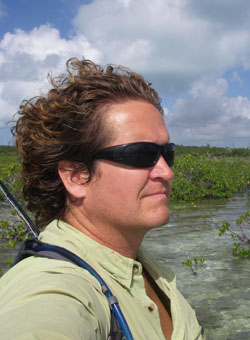 Dr. Jeffrey Stein is an Assistant Research Scientist at the Illinois Natural History Survey and Research Program Leader of the Sport Fish Ecology Lab. Dr. Stein studies basic and applied ecology of freshwater and marine fishes, seeking to understand linkages between ecological function and exploitation of populations by humans. Fundamentally, Dr. Stein seeks to explore how human activities can impact the reproductive ecology and behavior of fishes, ultimately translating findings into meaningful and effective conservation actions.
Dr. Jeffrey Stein is an Assistant Research Scientist at the Illinois Natural History Survey and Research Program Leader of the Sport Fish Ecology Lab. Dr. Stein studies basic and applied ecology of freshwater and marine fishes, seeking to understand linkages between ecological function and exploitation of populations by humans. Fundamentally, Dr. Stein seeks to explore how human activities can impact the reproductive ecology and behavior of fishes, ultimately translating findings into meaningful and effective conservation actions.
Current research at the Sport Fish Ecology Lab examines the biological underpinnings of capture vulnerability to fishing and the evolutionary consequences of recreational fishing on the life history, behavior and physiology of Largemouth Bass and Bluegill. Additionally, Dr. Stein’s lab studies the recovery of native Lake Trout in southern Lake Michigan, the growing popularity of recreational fishing targeting gars and Bowfin, and the spatial ecology of Bonefish in the Caribbean.
A large component of Dr. Stein’s dissertation research investigated the impact of catch-and-release angling on the reproductive life history and recruitment dynamics of largemouth bass (Micropterus salmoides), a popular freshwater sport fish. As a species that provides parental care during the earliest phases of juvenile development, largemouth bass are an excellent model for examining the importance of parental care in determining recruitment dynamics and, more broadly, variations in population size in exploited systems. I conducted a suite of observational studies, manipulative experiments and population modeling studies to determine whether reductions in individual reproductive success can be detected as reductions in recruitment at the populations level. Understanding the importance of reproductive success as a determining factor in recruitment processes has significant conservation implications for this highly popular sport fish, particularly for populations where brood predator densities and angler exploitation rates are high.
The role of the angler is a key component of Dr. Stein’s current research interests. As such, he utilizes a variety of approaches to investigate hypotheses that test the impacts of angling on sport fish populations spanning several species and systems. For example, one of his recent graduate students (Dr. Michael Louison) studied the physiology and behavior of lure striking in Largemouth Bass and Bluegill. Additionally, in an angling study extending work published by his mentor and advisor (Dr. David P. Philipp), Dr. Stein is investigating the persistence of selected and inherited differences in capture vulnerability in angled Largemouth Bass. Dr. Stein also collaborates with Dr. John Janssen (UW-Milwaukee) studying the rehabilitation and natural reproduction of Lake Trout in southern Lake Michigan. This line of research is exemplary of how overfishing can nearly extirpate native species while also demonstrating the results of decades of strategic investment in the recovery of decimated sport fishery stocks.
Over the last several years, Dr. Stein has worked closely with renown Gar expert Dr. Solomon David (Nicholls State University) to study the life history, population dynamics, spatial ecology, genetics and exploitation of Gars and Bowfin. Known as the Ancient Sport Fishes Project, this research efforts seeks to shine a light on a poorly understood and much maligned group of fishes. Studies include age and growth, acoustic telemetry, and creel surveys of anglers at Bowfishing tournaments, all designed to inform sustainable management of these amazing creatures.
In the marine environment, Dr. Stein collaborates with a diverse team of researchers seeking to elucidate the behavioral and physiological responses of bonefish (Albula vulpes) to catch-and-release angling events. Bonefish are a marine sport fish that inhabit tidal flats and coastal mangrove systems, although little is known about their reproductive behavior. Dr. Stein’s interest in bonefish is centered on gaining an understanding of their basic life history and reproductive behavior characteristics as a way to promote their conservation. Bonefish are regular inhabitants of coastal areas that are at risk of unchecked development in many locales around the globe. A clearer understanding of bonefish reproductive behavior and the behavior and physiological responses to angling are key steps to implementing conservation practices to maintain sustainable populations and promote healthy fisheries.
Equally important to my research is the use of field ecology studies as a method for gaining an intimate understanding of the systems I study. My research has benefited from the use of world-renown field stations specializing in supporting field ecology studies, whether observational or experimental in nature, as well as productive collaborations with researchers from a variety of institutions and disciplines. Components of my research also utilize experimental approaches to fish ecology, including almost ten years of research conducted at the Illinois Natural History Survey research ponds in Champaign. By incorporating observational and manipulative studies, field-based and mesocosm-style experiments, and data modeling and statistical approaches, I strive to deliver innovative and cutting edge fisheries research that informs proactive conservation actions.

